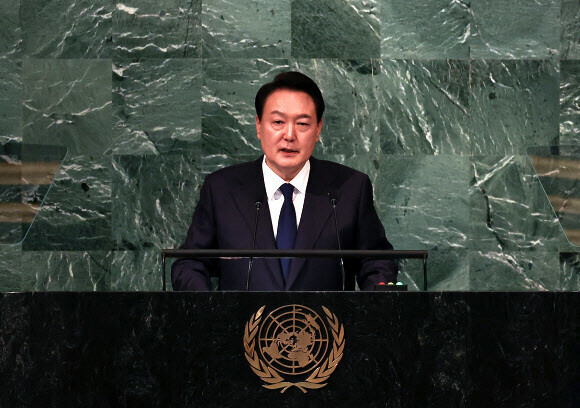hankyoreh
Links to other country sites 다른 나라 사이트 링크
[Editorial] Diplomacy takes more than platitudes

Addressing the UN General Assembly for the first time on Tuesday, President Yoon Suk-yeol urged countries that share the universal value of freedom to work together in order to overcome the complex set of crises confronting the international community.
Yoon also indirectly pressured North Korea, stating, “Today, the global community is yet again witnessing freedom and peace of its citizens put in jeopardy. Attempts to alter the status quo by force endangers the lives of innocent people; nuclear weapons and other weapons of mass destruction pose increasing threats to humanity; systemic violations of human rights leave millions of children deprived of their future.”
However, he did not make reference to his “audacious initiative,” which has prompted opposition from North Korea.
The keyword that made the most appearance during Yoon’s speech was “freedom,” just like during his inauguration speech in May and his speech commemorating Korea’s Liberation Day.
Yoon said, “Genuine freedom and peace can turn into reality when we are free from disease and hunger, free from illiteracy and free from want of energy and culture.” He also stressed the importance of values-based solidarities, which he has previously touched on time and time again, stating, “Threats to freedom and peace must be overcome through solidarity and fearless commitment to the framework of universal global norms consolidated over the years within the UN system.”
Yoon also pledged US$300 million toward the vaccine and treatment joint initiative led by the World Health Organization, as well as US$30 million towards the World Bank’s Financial Intermediary Fund. In addition, he also mentioned that South Korea will drastically increase its contribution to the Global Fund to Fight AIDS, Tuberculosis and Malaria, which aims to respond to global infectious diseases.
Having kickstarted his UN diplomacy with a speech emphasizing “freedom and solidarity,” Yoon will be further put to the test during the South Korea-US summit and the South Korea-Japan summit currently being arranged. If Yoon doesn’t make any progress on conundrums South Korea faces, such as the issue of discrimination against Korean-made electric vehicles prompted by the Inflation Reduction Act or the issue of forced labor during the Japanese colonial period, the emphasis he has been putting on “values-based alliances” will turn lackluster.
In that sense, it is worrying that Japan responded with displeasure to the South Korean presidential office’s Thursday announcement that it “came to an agreement with Japan early on to hold a South Korea-Japan summit,” and that the schedule for the summit is still up in the air. Concerns are being raised that the South Korean presidential office has been cornered into a disadvantageous position after prematurely announcing the agreement regarding the summit.
During Monday’s meeting between the respective foreign ministers of South Korea and Japan, the latter reportedly maintained its previous position that South Korea should come up with a solution to the current impasse, “as the issue of forced labor has already been resolved through the 1965 Treaty on Basic Relations.” This is in sharp contrast to Yoon’s statement during a recent New York Times interview that he wants to strike a “grand bargain” with Japan regarding the forced labor issue, South Korea-Japan security cooperation, and pending economic and trade issues.
Instead of scrambling to put on a show of improved South Korea-Japan relations for political reasons, Yoon should consider the domestic situation in both countries and smooth out and finetune his diplomatic strategy and its details.
Please direct questions or comments to [english@hani.co.kr]

Editorial・opinion
![[Column] When ‘fairness’ means hate and violence [Column] When ‘fairness’ means hate and violence](https://flexible.img.hani.co.kr/flexible/normal/500/300/imgdb/original/2024/0516/7417158465908824.jpg) [Column] When ‘fairness’ means hate and violence
[Column] When ‘fairness’ means hate and violence![[Editorial] Yoon must stop abusing authority to shield himself from investigation [Editorial] Yoon must stop abusing authority to shield himself from investigation](https://flexible.img.hani.co.kr/flexible/normal/500/300/imgdb/original/2024/0516/4417158464854198.jpg) [Editorial] Yoon must stop abusing authority to shield himself from investigation
[Editorial] Yoon must stop abusing authority to shield himself from investigation- [Column] US troop withdrawal from Korea could be the Acheson Line all over
- [Column] How to win back readers who’ve turned to YouTube for news
- [Column] Welcome to the president’s pity party
- [Editorial] Korea must respond firmly to Japan’s attempt to usurp Line
- [Editorial] Transfers of prosecutors investigating Korea’s first lady send chilling message
- [Column] Will Seoul’s ties with Moscow really recover on their own?
- [Column] Samsung’s ‘lost decade’ and Lee Jae-yong’s mismatched chopsticks
- [Correspondent’s column] The real reason the US is worried about Chinese ‘overcapacity’
Most viewed articles
- 1Could Korea’s Naver lose control of Line to Japan?
- 2[Column] Welcome to the president’s pity party
- 3[Column] US troop withdrawal from Korea could be the Acheson Line all over
- 4Naver’s union calls for action from government over possible Japanese buyout of Line
- 5[Editorial] Korea must respond firmly to Japan’s attempt to usurp Line
- 6Korea cedes No. 1 spot in overall shipbuilding competitiveness to China
- 7[Editorial] Yoon must stop abusing authority to shield himself from investigation
- 8[Column] When ‘fairness’ means hate and violence
- 9Korean opposition decries Line affair as price of Yoon’s ‘degrading’ diplomacy toward Japan
- 10Second suspect nabbed for gruesome murder of Korean in Thailand, 1 remains at large